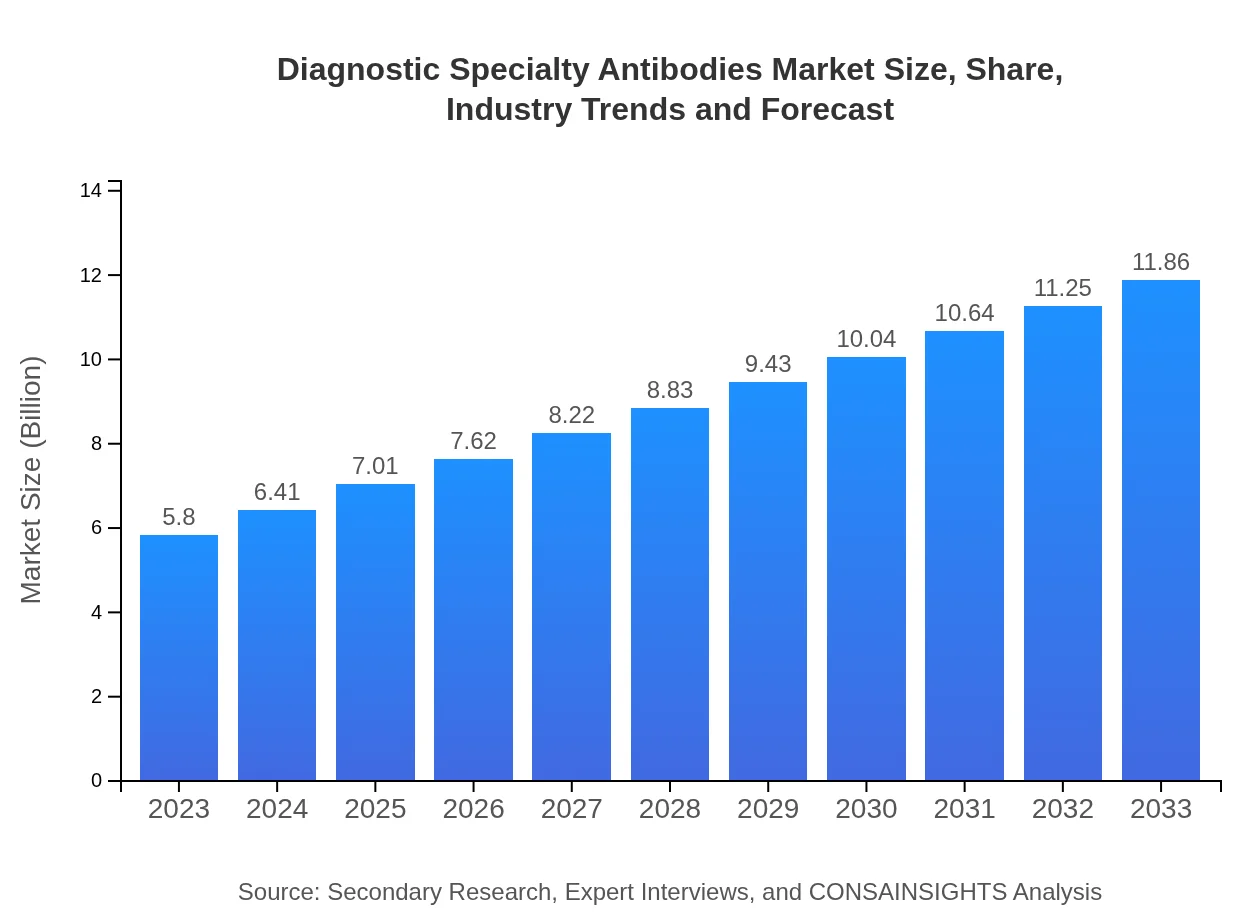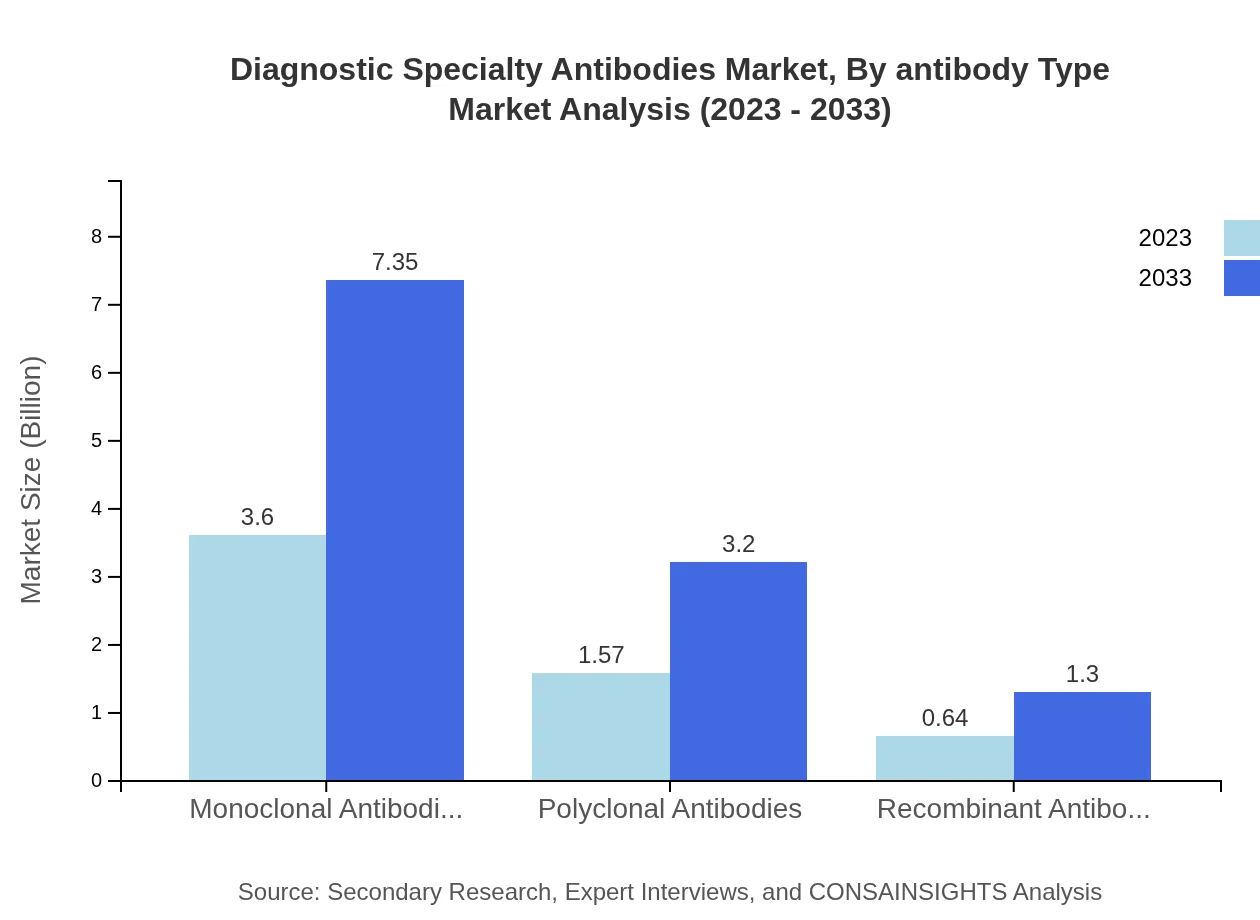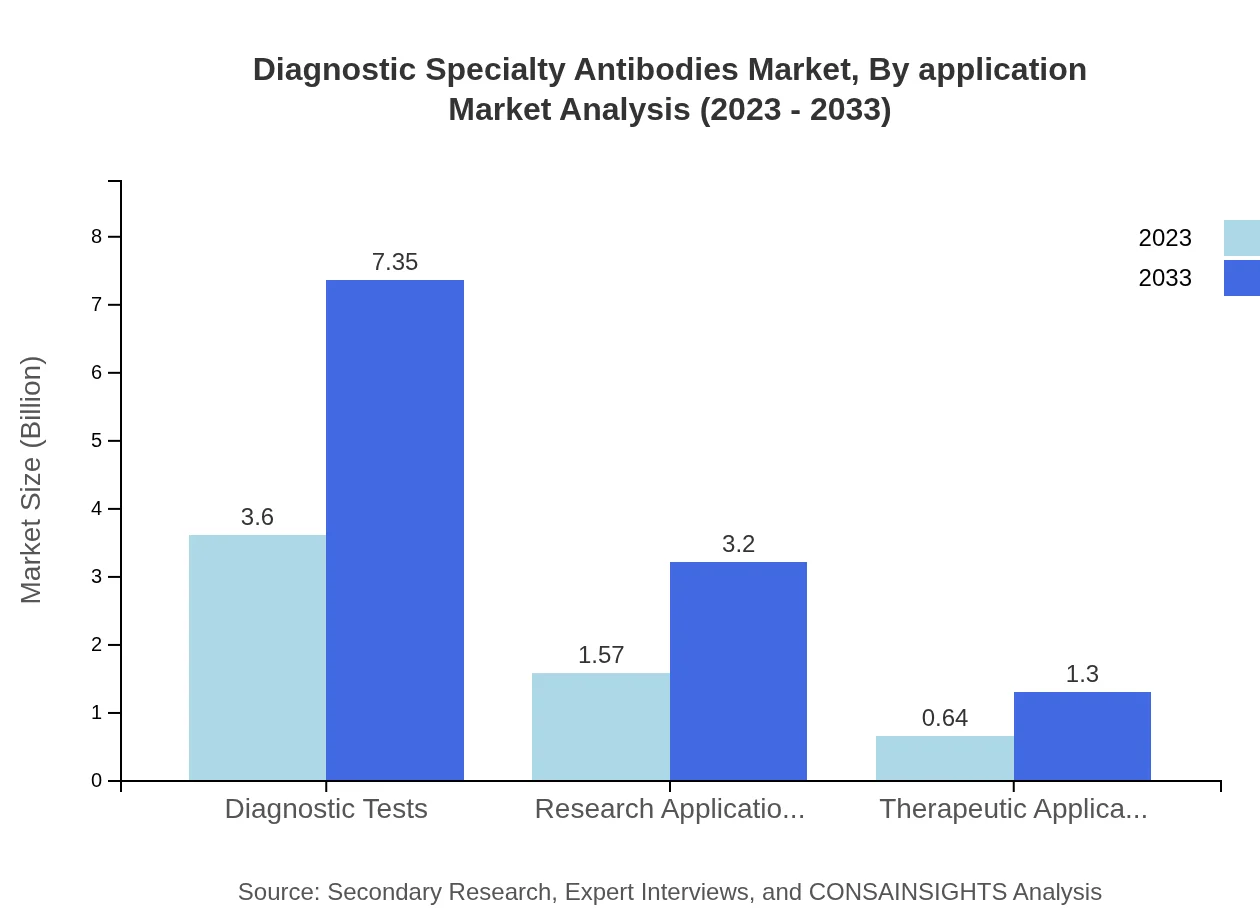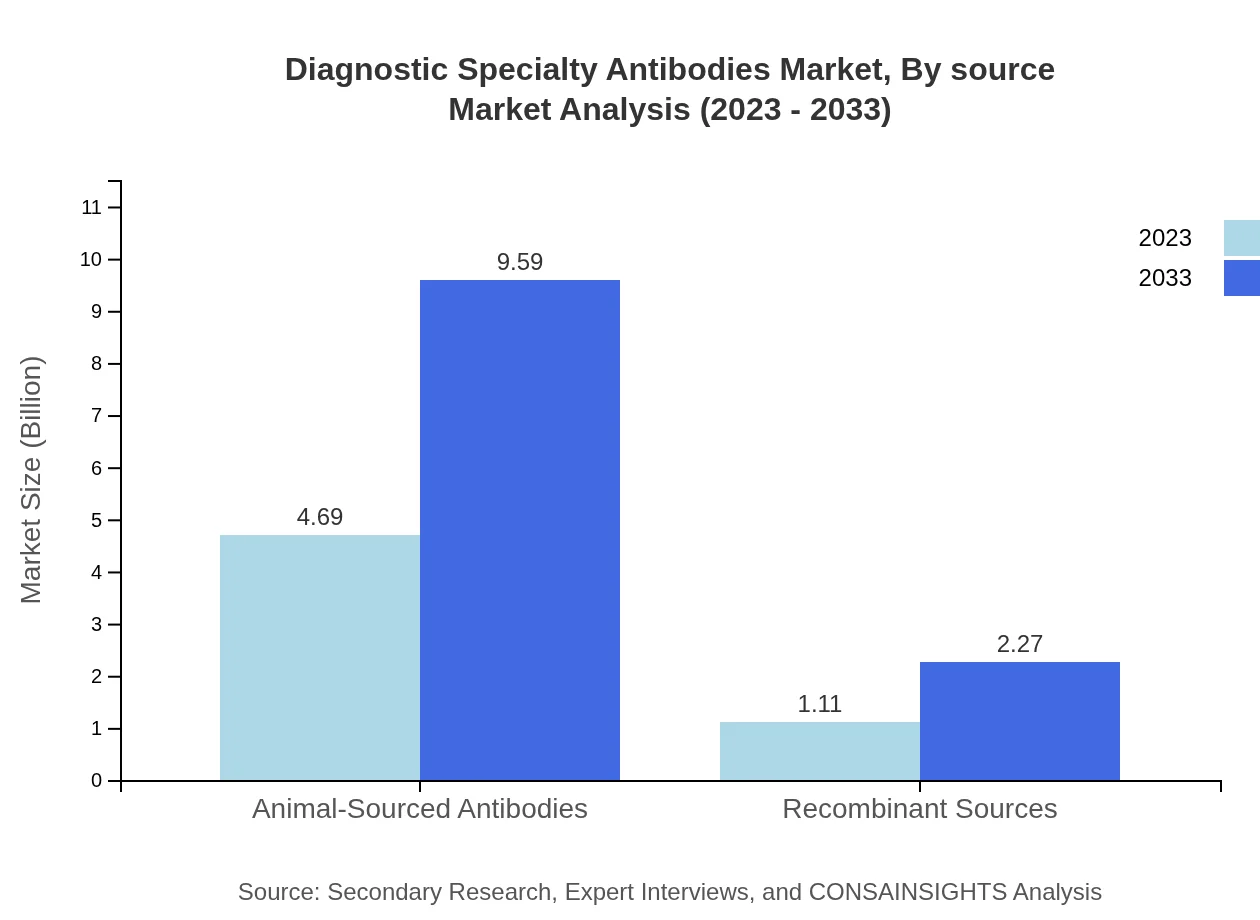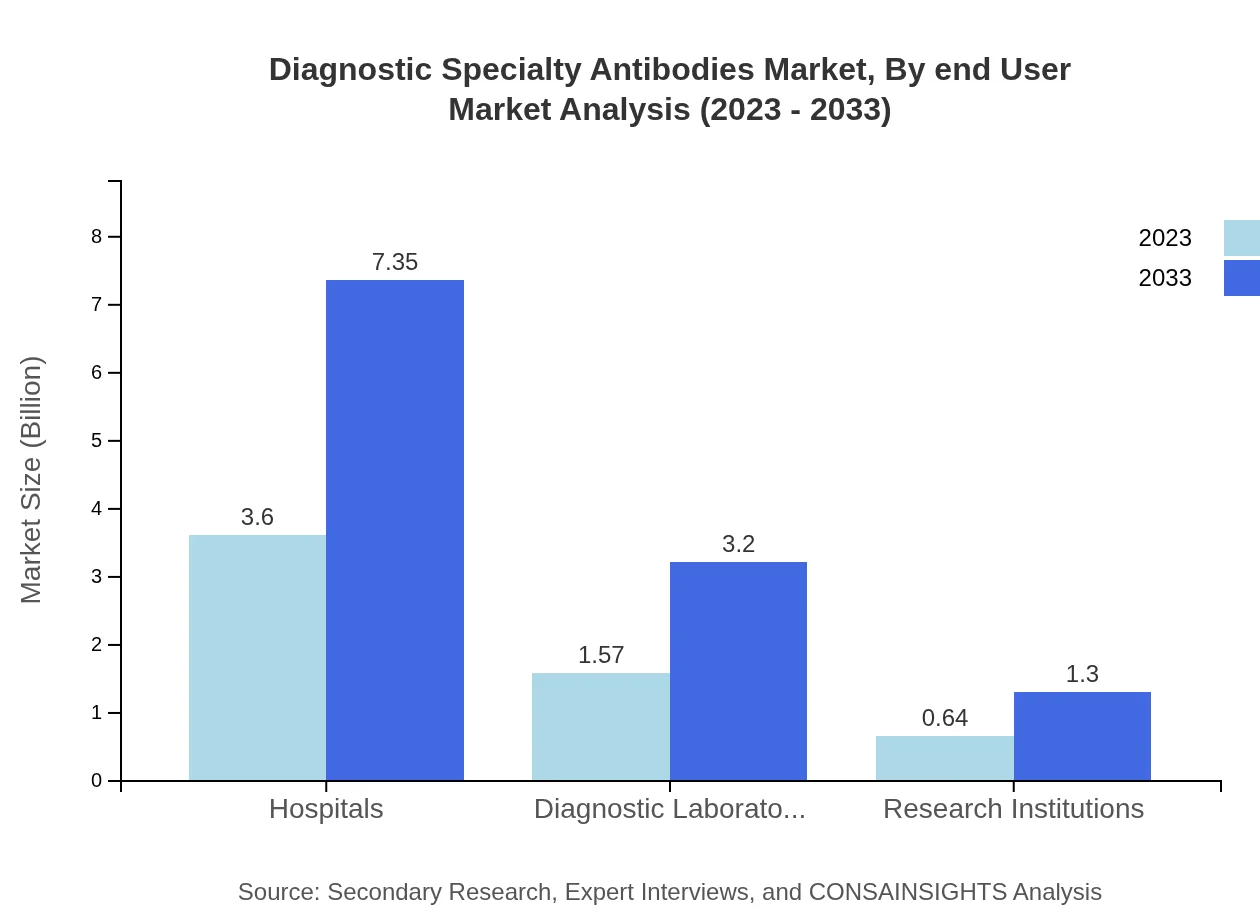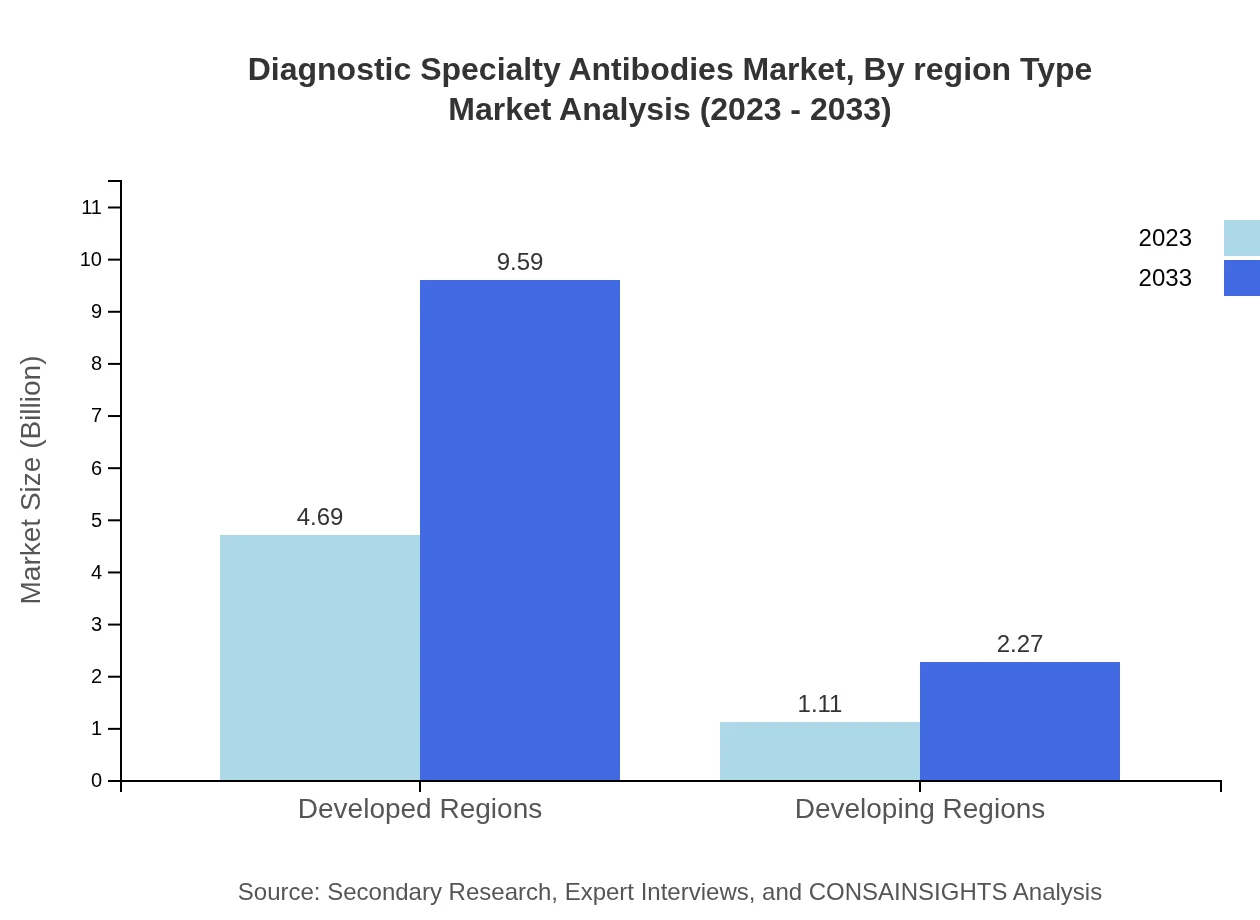Diagnostic Specialty Antibodies Market Report
Published Date: 31 January 2026 | Report Code: diagnostic-specialty-antibodies
Diagnostic Specialty Antibodies Market Size, Share, Industry Trends and Forecast to 2033
This report provides an in-depth analysis of the Diagnostic Specialty Antibodies market, including insights on market size, growth trends, segmentation, and forecasts from 2023 to 2033.
| Metric | Value |
|---|---|
| Study Period | 2023 - 2033 |
| 2023 Market Size | $5.80 Billion |
| CAGR (2023-2033) | 7.2% |
| 2033 Market Size | $11.86 Billion |
| Top Companies | Roche Diagnostics, AbbVie, Thermo Fisher Scientific, Merck Group |
| Last Modified Date | 31 January 2026 |
Diagnostic Specialty Antibodies Market Overview
Customize Diagnostic Specialty Antibodies Market Report market research report
- ✔ Get in-depth analysis of Diagnostic Specialty Antibodies market size, growth, and forecasts.
- ✔ Understand Diagnostic Specialty Antibodies's regional dynamics and industry-specific trends.
- ✔ Identify potential applications, end-user demand, and growth segments in Diagnostic Specialty Antibodies
What is the Market Size & CAGR of Diagnostic Specialty Antibodies market in 2023?
Diagnostic Specialty Antibodies Industry Analysis
Diagnostic Specialty Antibodies Market Segmentation and Scope
Tell us your focus area and get a customized research report.
Diagnostic Specialty Antibodies Market Analysis Report by Region
Europe Diagnostic Specialty Antibodies Market Report:
In Europe, the market is anticipated to rise from $1.45 billion in 2023 to $2.96 billion by 2033. The region's stringent regulatory environment and increasing approvals of monoclonal antibodies for therapeutic diagnostics significantly boost market growth.Asia Pacific Diagnostic Specialty Antibodies Market Report:
In the Asia Pacific region, the Diagnostic Specialty Antibodies market is expected to grow from $1.11 billion in 2023 to $2.27 billion by 2033. Key factors contributing to this growth include an expanding healthcare infrastructure, increasing investments in research and development, and a growing population with rising healthcare needs.North America Diagnostic Specialty Antibodies Market Report:
North America remains the leading market, expected to grow from $2.19 billion in 2023 to $4.48 billion by 2033. This growth can be attributed to advanced healthcare systems, a strong presence of biopharmaceutical companies, and significant investment in biotechnology research.South America Diagnostic Specialty Antibodies Market Report:
The South American market for Diagnostic Specialty Antibodies is projected to increase from $0.27 billion in 2023 to $0.55 billion by 2033. Growth is driven by rising awareness of diagnostic tools and a growing focus on healthcare improvements amid economic development in various countries.Middle East & Africa Diagnostic Specialty Antibodies Market Report:
The Middle East and Africa region is set to expand from $0.78 billion in 2023 to $1.60 billion by 2033, driven by improvements in healthcare facilities, increased funding for diagnostic diseases, and rising awareness of specialized diagnostics.Tell us your focus area and get a customized research report.
Diagnostic Specialty Antibodies Market Analysis By Antibody Type
The market segmentation based on antibody type reveals that monoclonal antibodies represent the largest share at 62.01% in 2023, growing significantly to 62.01% in 2033. Polyclonal antibodies account for 26.99% in 2023, with projections suggesting stability in demand due to their widespread use in diagnostics and therapy. Recombinant antibodies are expected to grow from a 11% share in 2023 to the same share in 2033, indicating steady interest but lesser growth compared to other types.
Diagnostic Specialty Antibodies Market Analysis By Application
The Diagnostic Tests segment, crucial for clinical diagnostics, comprises 62.01% of the market share in 2023, expected to reach 62.01% by 2033. Research Applications hold a share of 26.99% in 2023 and will maintain this proportion, underscoring the importance of antibodies in advancing scientific research. Therapeutic Applications, although smaller at 11% in 2023, are projected to grow steadily, reflecting evolving therapeutic landscapes.
Diagnostic Specialty Antibodies Market Analysis By Source
Animal-sourced antibodies dominate the market, accounting for 80.85% in 2023, expected to maintain the same share by 2033. Recombinant sources represent a growing segment, currently at 19.15% in 2023 and projected to remain constant, indicating a stable demand for genetically engineered solutions due to their specificity and lower production issues.
Diagnostic Specialty Antibodies Market Analysis By End User
Hospitals are the key end-user segment, commanding a market share of 62.01% in 2023 and projected to remain at that level through 2033. Diagnostic laboratories follow closely with a share of 26.99%, reflecting their critical role in disease identification. Research institutions, while holding a smaller share of 11% in 2023, highlight their importance in innovation and development within the industry.
Diagnostic Specialty Antibodies Market Analysis By Region Type
The differentiated analysis by region highlights that developed regions, which account for 80.85% of the market share in 2023, are expected to keep this proportion in 2033. Developing regions currently at 19.15% indicate a promising upward trend as healthcare advancements penetrate these markets.
Diagnostic Specialty Antibodies Market Trends and Future Forecast
Tell us your focus area and get a customized research report.
Global Market Leaders and Top Companies in Diagnostic Specialty Antibodies Industry
Roche Diagnostics:
Roche is a leading player in the diagnostics market with a strong portfolio in monoclonal antibodies, significantly contributing to advancements in diagnostic testing.AbbVie:
AbbVie focuses on bio-pharmaceuticals, offering innovative diagnostic solutions including various specialty antibodies.Thermo Fisher Scientific:
A major player in providing high-quality laboratory products, including diagnostic specialty antibodies for clinical and research applications.Merck Group:
Merck provides a wide array of diagnostic and therapeutic antibodies, leveraging biotechnology for specific disease diagnostics.We're grateful to work with incredible clients.









FAQs
What is the market size of diagnostic Specialty Antibodies?
The diagnostic specialty antibodies market is valued at approximately $5.8 billion in 2023. It is projected to grow at a compound annual growth rate (CAGR) of 7.2%, indicating significant growth potential in the upcoming years.
What are the key market players or companies in the diagnostic Specialty Antibodies industry?
Key players in the diagnostic specialty antibodies market include leading biotechnology and pharmaceutical companies specializing in antibody development. While specific names are subject to market dynamics, these companies are known for innovation and extensive research in diagnostics.
What are the primary factors driving the growth in the diagnostic Specialty Antibodies industry?
Growth in the diagnostic specialty antibodies market is driven by increasing prevalence of diseases, advancements in antibody technology, and rising demand for personalized medicine. Additionally, expanding healthcare infrastructure and growing research activities support market expansion.
Which region is the fastest Growing in the diagnostic Specialty Antibodies?
The fastest-growing region in the diagnostic specialty antibodies market is North America, projected to grow from $2.19 billion in 2023 to $4.48 billion by 2033. Following that, Europe shows significant growth, increasing from $1.45 billion to $2.96 billion.
Does ConsaInsights provide customized market report data for the diagnostic Specialty Antibodies industry?
Yes, ConsaInsights offers customized market reports tailored to specific needs in the diagnostic specialty antibodies industry. This includes detailed analyses and insights aligned with individual business strategies and market objectives.
What deliverables can I expect from this diagnostic Specialty Antibodies market research project?
Deliverables from the diagnostic specialty antibodies market research project typically include comprehensive market reports, trend analysis, competitive landscape assessments, and forecasts that help inform strategic decision-making for stakeholders.
What are the market trends of diagnostic Specialty Antibodies?
Current trends in the diagnostic specialty antibodies market include increased focus on monoclonal and polyclonal antibodies, growth in diagnostic laboratories, and a shift towards advanced recombinant technologies, reflecting innovative solutions in disease detection.

